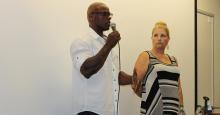As 14-year-old Barry Massey was being tried in Pierce County for aggravated murder, he fell asleep at the defense table. Unaware of the severity of the situation, he had no way of knowing that his entire life was hanging in the balance.
In 1987, Massey became the youngest person in the country to be given a life without the possibility of parole sentence. But earlier this year, after 28 years in prison, he was released, due to a landmark U.S. Supreme Court ruling.
On Monday, April 18, Barry Massey, joined by his wife Rhonda, shared his experiences with a room of students as a guest lecturer for Professor Ann Frost’s LSJ 377, “Punishment Theory and Practice” course. He detailed his experiences from the day he was picked up, through his life in prison, to living as a free man today.
“I think that his story shows a side of the prison system that we don’t get to see in theory,” said LSJ student and freshman Katrina Punzalan. “His story got me thinking about the incarceration system in a new light.”
His story began as a young child growing up in Tacoma. Considered a “good kid” for most of his childhood years, everything changed when Massey joined his friend Michael Harris in a robbery of a bait store, whose owner, Paul Wang, was killed in the process.
Under the recommendation of a prosecutor, Massey was transferred to the adult system at the young age of 13. Even though psychologists considered him to be quite immature with a mental age of 9.9, and suggested that he be kept in a juvenile center, the prosecutor’s decision stood, and he was ultimately tried and convicted as an adult.
“My situation is unique. But the juvenile system, children being picked up is not that unique,” Massey said. “What makes me unique is that I was so, so young. It’s uncommon for someone 13 or 14 to be tried as an adult.”
As a 15-year-old in prison, Massey was held in isolation for 23 hours a day for over a month. When he was released from isolation, he often got into fights, with nothing else for him to do.
However, he soon turned his life around after being introduced to books. The last time he ever got a major infraction was in 1996.
“All my experiences have been through books,” Massey said. “I escaped my prison through reading.”
Meeting his future wife, Rhonda Massey, then a corrections officer at the Washington State Reformatory in Monroe, similarly provided him with the support he needed to continue bettering himself, even though he believed he was never getting out.
Massey and Rhonda first met in 1997 when Rhonda started working at the prison. Their relationship did not intensify until years later, at which point Rhonda quit her job.
Since then, she has been a steadfast presence in his life. She was instrumental in supporting Barry through two clemency hearings, in 2006 and 2010, although neither was successful.
But in 2012, in its decision in Miller v. Alabama, the U.S. Supreme Court held that a mandatory life without the possibility of parole sentence was unconstitutional for juveniles. In 2014, the Washington state legislature passed a bill that provided a process for individuals like Barry to potentially be released.
In February 2016, Massey was finally released from prison into the custody of his wife, with many challenges still ahead of him. He dreams of working with youth to prevent what happened him from happening to others.
For all who attended the talk, it is clear that Massey is more than capable of bringing such issues regarding the criminal justice system to the forefront.
“It is becoming clear to many that incarceration is not appropriate for all offenders, particularly in a system that offers so few services to those who are incarcerated,” said Dr. Frost. “Many states are reaching the conclusion that life sentences and mandatory lengthy sentences are not successful in achieving goals such as deterrence and rehabilitation. There are other options and we should be considering the individual circumstances of each defendant when considering an appropriate punishment for a criminal conviction.”
Massey echoed this sentiment saying, “I needed to be punished. But I don’t know if needed to be punished exactly that way.”
Still, Massey is far from bitter about his situation.
“It’s a rollercoaster,” he said. “You’ve got to accept the good and the bad.”
By Medha Raman
